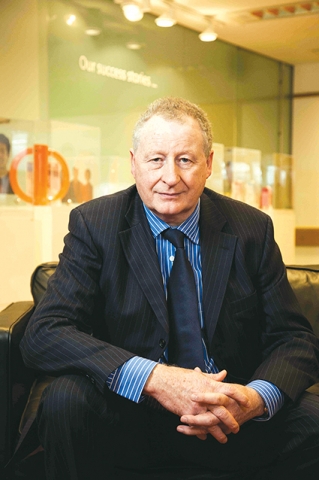Bringing the Fear Factor to Georgia
Last week, Alderman Derek Pickup, Honorary Consul of Georgia for South West England, First Guardian of Tbilisi and Chair of the Bristol -Tbilisi Association came to Georgia with Stephen Fear, Founder and Chairman of the Fear Group, to help him explore investment opportunities in the field of tourism, infrastructure, housing and agriculture. Paul Hinchcliffe of the Bristol Business School, University of the West of England, also joined the group, looking to establish new university connections, with meetings planned at the Ilia and Tbilisi State universities.
GEORGIA TODAY met the British gentlemen towards the end of their visit to find out what they had achieved and just how they planned to invest in Georgia’s bright future.
Paul Hinchcliffe lived in Georgia from 2004-2009, training air traffic controllers and trainers. Now at the University of the West of England as a Lecturer in Business and Law, he is still very active in fields beyond air traffic control and has, as he says, “No intention of retiring”. Happy to be back in Georgia, he tells us about the exchange programs he hopes to expand in Georgia. “We get 2-3 Georgian students a year coming to study Master’s degrees,” he says, “But we have connections with universities in the Far East, Malaysia, China and Vietnam where students can do one year in one university, then continue their education elsewhere, with Year 3 in the UK. We want to develop that here across a whole range of subjects”. We ask how his meetings went with the State university rectors and he says there was “definite interest to move forward” but that the “roll out” for any new program could be around two years. Back in the UK, a session of the upcoming Wardrop Strategic Dialogue is to be held at the University of the West of England. “We’re looking forward to the impetus this will generate. The Rector will be coming to Bristol and we’ll be inviting him to stay longer to talk about partnership opportunities with Georgia”.
Hinchcliffe was also in Georgia supporting Stephen Fear regarding several potential directions for business that they have been jointly looking into. “In my years here, Tbilisi did get under my skin. If we can do something that will make a difference, we might be able to encourage other people to come in, too,” he says.
Stephen Fear is an English entrepreneur, businessman, philanthropist and author with nearly 50 years of international business experience. He has an established property empire and interests in a number of industries, including green technology, hotels, residential care and manufacturing.
Fear is Chairman and Founder of Fear Group, an international organization which has interests in strategic land promotion, international property development and investment.
He tells GEORGIA TODAY that Georgia first came up on his company’s list of potential investment hotspots some 18 months ago. “I created a research division of my business 30 years ago to analyze trends around the world for commercial investment opportunities”. He gives the example of a new railroad being built in India: “we analyze how it will affect the local population, transport, employment. We have a piece of software which analyses our ‘top ten;’ it can be cities, continents, regions, even individual areas. A major school built in Derbyshire would throw up the need for housing, so we might buy land there. Say we hear a new dam is being built in Russia or Central Asia; we’ll look at the nearest cement work suppliers and pre-buy all the cement in that works so we control the supply. Governments want to use our facility, but we’re strictly internal,” he says with a smile.
What in Georgia set off the alarm on his program? “After the 2008 War, the country obviously trended downwards, but for some inexplicable reason it quickly started to knock the red line again and again, leading us to start looking at its potential: its natural resources, strategic location, importance to both Russia and the US, etc. but I’ve only now managed to come myself”.
His visit aimed to help him decide why Georgia might be coming to the top as an investment hotspot. “After five days, I’ve come to the conclusion that basically it’s the people: that was the bit missing off the graph. The people are generally very positive-minded, very welcoming. They just get on with things and they aren’t living as if they’re on the edge of Putin marching over the border; they just accept the possibility is there. Georgians want to be part of the West and there’s a clear determination [here] that there is no other way. It’s powerless militarily and it has the benefit of not having oil, otherwise it would already be part of Russia”.
We ask about wine and water, Georgia’s equivalent of ‘oil’. “We’ve been around the vineyards,” Fear tells us. “I’m keen to promote Georgian wines in the UK and US with my interests there and to help Georgian wine producers, even if not in terms of direct investment.” “The wine here over past ten years has risen in quality above all proportions,” Hinchcliffe interjects. “I remember Badagoni building up. The Russian embargo did so much for Georgian wine: it forced Georgian winemakers to rethink, then they brought in the Italians who just totally transformed the processes”.
Stephen agrees that the immigration of the right people can transform a country for the better. “Georgia needs not only more tourists, but also migrants from the intellectual field. It needs to develop something that is unique to Georgia as an export. We’re looking at the development of the country as a technology hub, as technology is a worldwide exporter. If Bill Gates had been born in Georgia, Microsoft would have been developed here and Georgia’s GDP would be through the roof,” he points out with a smile. “Who knows if the next Bill Gates is lurking around here somewhere? Georgia needs to develop an environment where such people can come to the fore, like Britain has done”. But first, wealth needs to be created, and that can be done through encouraging entrepreneurship. “If Georgia work towards entrepreneurs, it can never go wrong,” Fear says, and as the longest serving Entrepreneur in Residence at the British Library, he would surely know.
A big gripe Fear had with the capital of Georgia, one we have addressed many times before, is air pollution. “Horrendous,” he says. “Love the city and people, hate the traffic and diesel fumes”. He met the current Mayor and hopes to get acquainted with the next as he has a number of creative ideas to enliven the greener and cultural side of the city, including redeveloping the river to make an Artists’ Quarter and reconnect the river with the city it dissects. “The river is an untapped resource,” he says. “Think the Paris Left Bank, a boulevard, boats, floating restaurants, boating classes for kids…”.
The Fear Group has a substantial amount to invest in Georgia. And while the numbers are being crunched, Stephen Fear says he might consider swapping the American slopes for Georgian this upcoming Christmas holiday…as long as there’s internet.
“We want to raise the bar for everyone,” Fear says. “To do something that enhances the city, pulls people in and looks after those that are a bit less fortunate. Agriculture is another direction we’re looking into. We’re also open to ideas and welcome anyone to approach us if they believe their idea could work. We can see the great opportunities Georgia is offering. The country has quite a way to go before it gets to the level it needs to be at,” he concludes.
Katie Ruth Davies
Related stories












